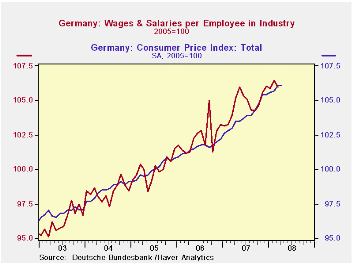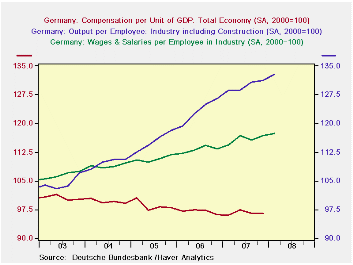 Global| May 19 2008
Global| May 19 2008Inflation in Germany: Real Wages and Unit Labor Costs
Summary
After rising sharply from 1% in September, inflation in Germany has moderated somewhat. In April 2008 it dropped to 2.41% from 3.10% in March. So far, inflation has not been a serious threat to the economy. Indexes (2005=100) of [...]

After rising sharply from 1% in September, inflation in Germany has moderated somewhat. In April 2008 it dropped to 2.41% from 3.10% in March. So far, inflation has not been a serious threat to the economy. Indexes (2005=100) of compensation of labor and the CPI, are shown in the first chart. Compensation has generally managed to exceed inflation, as a result real wages have advanced moderately.
From the standpoint of business, wage growth has been below
the growth in productivity so that unit labor costs have continued to
decline, as can be seen in the second chart. Since the unit labor cost
data are available only quarterly, the monthly wage and productivity
data are aggregated to a quarterly basis. The latter are available for
the first quarter of 2008, while the ULC data are only available for
the fourth quarter of 2007.
The recent trends in food and oil prices suggest that the future impact of inflation may be less benign.
| GERMANY | Mar 08 | Feb 08 | Mar 07 | M/M Chg | Y/Y Chg | 2007 | 2006 | 2005 |
|---|---|---|---|---|---|---|---|---|
| Hourly Compensation (2005 =100) | 106.0 | 109.4 | 104.0 | -0.04 | 2.3 | 104.8 | 102.3 | 100.0 |
| CPI (2005 =100) | 106.1 | 105.7 | 103.0 | 0.38 | 3.01 | 103.9 | 101.6 | 100.0 |
| Hourly Compensation (2005 =100) | 106.0 | 109.4 | 104.0 | -0.04 | 2.3 | 104.8 | 102.3 | 100.0 |
| Q1 08 | Q4 07 | Q3 07 | Q2 07 | Q1 07 | 2007 | 2006 | 2005 | |
| Productivity(2000=100) | 132.8 | 132.1 | 130.8 | 129.6 | 129.7 | 129.8 | 123.3 | 115.4 |
| Compensation of Labor (2000=100) | 117.4 | 116.7 | 115.7 | 116.8 | 114.5 | 115.9 | 113.2 | 110.7 |
| Unit Labor Cost (2000=100) | -- | 96.6 | 96.6 | 97.4 | 96.0 | 96.7 | 97.0 | 99.5 |
More Economy in Brief
 Global| Feb 05 2026
Global| Feb 05 2026Charts of the Week: Balanced Policy, Resilient Data and AI Narratives
by:Andrew Cates





